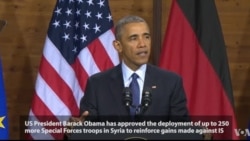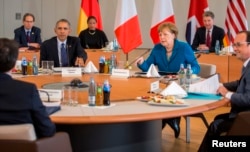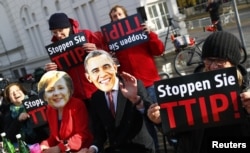President Barack Obama is ordering a significant increase in the number of U.S. Special Operations Forces in Syria and is urging European nations to ramp up their contributions to the coalition fighting Islamic State.
Speaking at an industrial trade fair Monday in Hannover, Germany, Obama says up to 250 additional personnel will join a team of about 50 U.S. troops in Syria.
“Their expertise has been critical as local forces have driven ISIL [Islamic State] out of key areas,” Obama said.
Earlier this month, the United States announced the deployment of an additional 200 troops and several Apache attack helicopters to Iraq, where they will help government forces there take back IS-held territory.
The additional U.S. troops will not be “leading the fight on the ground,” Obama pointed out, “but they will be essential in providing the training and assisting local forces that continue to drive ISIL back.”
WATCH: Obama on more US troops in Syria
Europe urged to step up
In remarks directed at the people of Europe, Obama called on America’s European partners to step up their efforts for “our collective security.”
“These terrorists are doing everything in their power to strike our cities and kill our citizens so we need to do everything in our power to stop them,” he argued.
“None of us can solve this problem by ourselves. Even as European countries make important contributions against ISIL, Europe, including NATO can still do more,” he said.
Obama also stressed the importance of a strong, prosperous and united Europe.
“A united Europe, once the dream of a few, remains the hope of the many and the necessity for us all,” he told a large audience.
Talks with European leaders
After his remarks, Obama met with his counterparts from Germany, Britain, France and Italy. The leaders discussed a broad strange of issues, including the agenda for a NATO summit that will be held in Warsaw in July. The agenda included talks on ways the United States, Europe and NATO partners can increase cooperation to combat Islamic State, confront a migration crisis in Europe, and Russian aggression in Ukraine.
"The leaders agreed that the implications of irregular migration to Europe posed a severe challenge that needed to be addressed in a comprehensive and sustainable manner, reflecting the values that Europe and the United States share: this implies ongoing NATO and EU activities as well as efforts to tackle the root causes of flight and migration," a White House statement said after the talks.
On Syria, it said the leaders "shared the growing concern that the increasing violations of the agreed cessation of hostilities by the regime and the continued obstruction of humanitarian access undermine efforts to bring relief to the Syrian people."
The leaders also welcomed continued progress by the U.S. -led coalition that has been fighting Islamic State, according to the White House.
Earlier, Obama toured the Hannover Messe fair grounds along with German Chancellor Angela Merkel. The event is known as world’s largest industrial technology fair.
Obama touted U.S. innovation and called for more international cooperation on trade and commerce.
Trade agreement
The two leaders expressed support for a landmark free-trade agreement between the United States and European Union, known as the Transatlantic Trade and Investment Partnership.
“We’ll see more partnerships, more trade and more jobs for our people on both sides of the Atlantic,” Obama said. “We both want to shape innovation. We want to be forward looking in this world of tomorrow.”
Supporters say the pact will boost the global economy and help smaller businesses compete on the world market. But opponents argue the accord would give multinational companies too much power at the expense of consumers and workers.
Joshua Fatzick contributed to this report in Washington








